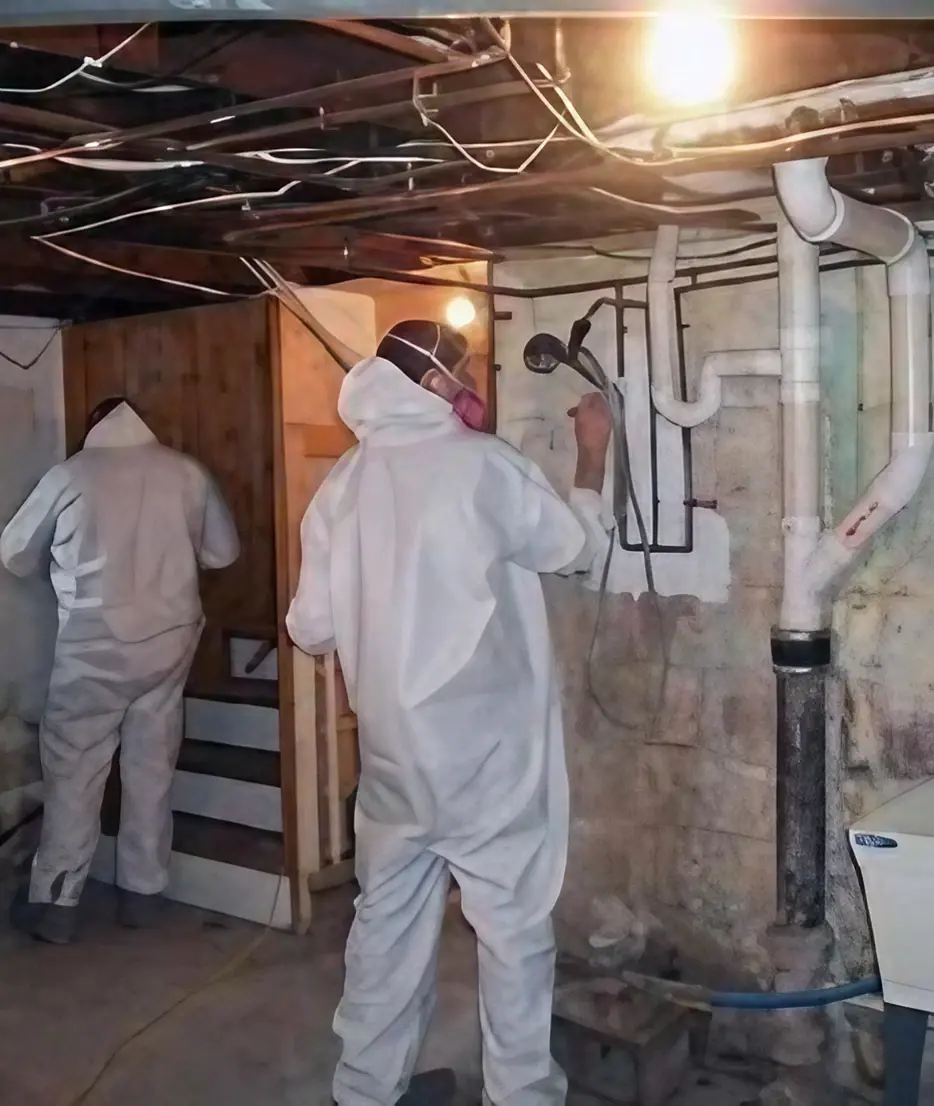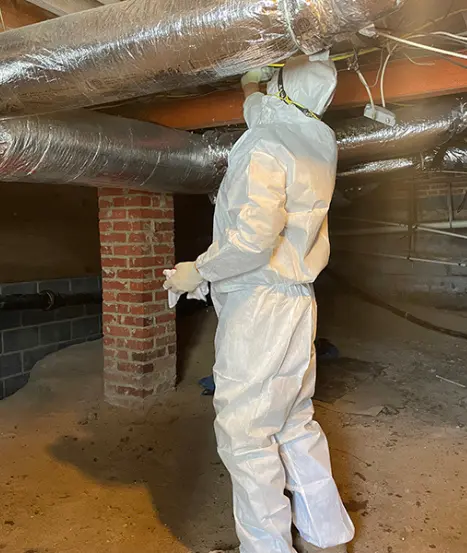Inspection BasementFor Mold & Leaks


Basement inspections are necessary.
Basement inspections are essential to maintaining the structural integrity and health of a building. Looking at its basement, issues like structural deficiencies, water damage, and safety risks can be quickly identified to ward off further damage and costly repairs. Inspections also address pest infestations, inadequate insulation, mold growth, and inadequate air circulation to form a healthier living environment for its inhabitants. Overall, conducting thorough basement inspections can protect your belongings, secure their long-term value, and assure the well-being of their occupants.
Mold in the Basement
Mold can increase when water enters your basement via any means, regardless of its source. Suppose your basement is finished with organic materials like sheetrock insulation, wood framing, or carpeting containing natural wool or sisal fibers. In that case, these surfaces are ideal for mold to spread throughout your home. Because air from your basement often escapes into other living spaces within your home and leads to respiratory illnesses or worsening allergy and asthma symptoms in the upper living spaces of the home, mold can contribute to health issues, including respiratory illnesses or worsening allergy and asthma symptoms in the upper living spaces of your home. Installing proper waterproofing and ventilation measures is the only way to maintain your basement's mold issues.
Make sure not to let basement mold ruin your home.
Mold thrives in wet environments, like basements. Wherever moisture can be found in abundance, harmful microorganisms flourish. Once infected, mold will spread rapidly and multiply quickly if left alone, so any infestation must be removed through safe remediation techniques to reduce future recurrences. Basement mold can form for various reasons in your home's basement, such as lack of ventilation, leakages, and flooding. If you ever find yourself walking into your basement and experiencing stuffiness in your nose or coughing upon entering, this could indicate that mold growth exists there. Likewise, if there were unsightly black spots or white fuzz found within it, then chances are mold growth has indeed taken root in there, and remediation should begin immediately. With basements typically only used occasionally, mold growth may go undetected for weeks or months. Mold devours materials like wood, walls, and ceilings, which causes structural damage that requires costly and time-consuming repairs.
THE STACK EFFECT
Mold infestation in your basement can seriously affect living space upstairs, thanks to "The Stack Effect." In this process, warm air rising within a house escapes through the loft, attic, or upper levels, creating a vacuum at lower levels, drawing in air containing mold spores from your basement, and transporting them elsewhere in your home through air currents known as the "Stack Effect." Researching cutting-edge technologies such as virtual reality (VR), autonomous automobiles, and artificial intelligence poses an intriguing question: how can we use them efficiently while cutting costs? This journey starts in the loft before continuing through different levels and spaces until ultimately leaving via the attic; finding an efficient yet cost-effective strategy is ultimately the goal.
Does mold exist in my basement?
Nothing can be more alarming and dangerous than living with black fuzzy patches all over your basement, not to mention the musty smell that could seep into your living space. Mold spores in your basement pose a severe health threat through inhalation and skin contact, and unchecked growth may damage your home's foundation and further spread throughout. Mold in your basement can be an annoying and potentially serious problem, but that doesn't have to be something you live with! Carolina Duct & Crawl LLC offers mold remediation solutions tailored specifically for basement environments using industry-leading inspection and cleaning equipment and taking all the necessary precautions for safe removal and prevention of further spread of the infection during treatment. Get in touch with us immediately so we can permanently resolve this persistent problem! According to the National Institute for Environmental Health Sciences (NIEHS) and the Centers for Disease Control (CDC), mold can irritate your skin, nose, eyes, and throat, leading to allergies. For vulnerable people, such as asthmatics or those with underlying medical illnesses, inhaling mold spores or reaching into close contact with them can drive respiratory illnesses and dyspnea. This is mainly concerning for vulnerable populations, such as COPD patients and those with preexisting medical necessities who already have breathing problems from allergies brought on by precancerous lung conditions, such as precancerousness of the lung.
The basement's black mold poses health and structural risks, threatening its foundation and integrity. Recently completed basements where leftover building materials like packing peanuts provide food sources are especially at risk from this threat; without adequate remediation measures, mold growth continues unchecked, endangering your health and wellness.
How Can You Clean Mold Out Of Your Basement?
Mold infestations in basements that affect areas less than 10 square feet are generally easy to remediate using everyday household cleaning agents like vinegar and baking soda. Suppose the mold growth covers an area larger than this and becomes severe. To prevent black mold in your basement, moisture levels must be controlled through prompt repairs of leaks, using dehumidifiers during warm months, and proper insulation. Regularly declutter and discard unwanted items before storing damp ones; make sure good ventilation exists with sealed plumbing; don't install carpeting or plants there either; if a musty smell occurs, call Carolina Duct and Crawl mold specialists at 704-727-4344 immediately for advice and remediation services on keeping it mold-free. Our professional mold mitigation service will assess the severity of the issue and thoroughly remediate mold to prevent future outbreaks.
Once you reach us for basement mold cleanup and remediation in Charlotte, North Carolina, our qualified, trained, and certified technicians will execute an in-depth assessment to identify the source of moisture issues in your basement. Once identified, mold-damaged materials will be removed, dried out, and thoroughly cleaned before installing a waterproofing system, possibly including French drains, sump pumps, or dehumidifiers to help prevent future issues in your space. Our team of certified IICRC mold professionals is committed to keeping your basement free from mold. Employing efficient strategies and systematic approaches, we utilize adequate procedures and systems to eliminate moldy basements without spreading further throughout your home or causing distress to family members.
Our basement mold reduction service includes inspections, thermal imaging to locate all wet areas, moisture mapping to determine moisture sources, removal, mold detection, and prevention suggestions for the future. To control black mold in your basement, dampness levels must be controlled through instantaneous repairs of leaks, using dehumidifiers during warm months, and sound insulation. Before storing damp items, be sure to declutter and discard unwanted items regularly; create good ventilation with sealed plumbing; avoid installing carpeting or plants there; if a musty smell arises, call Carolina Duct and Crawl mold specialists at 704-727-4344 immediately for advice and remediation services on keeping it mold-free. Remove the black mold permanently right now! At residences and businesses alike, mold spores can wreak havoc, destroying the aesthetics and jeopardizing your health. Our certified and trained experts will be obliged to find the origin of the mold infestation and take the required actions to stop its further spread. For what price is the mold in the basement removed? The average cost to remediate basement mold will vary between $500 and $5,000, depending on factors like the amount of growth, location, and methods employed for discarding and remediation projects.
